
Jesus and family walked about 80 miles each way at Passover for nearly 30 years----from Nazareth to Jerusalem, Israel----on foot. It would have been more than a day’s journey with no motels, rest stops, or caravansaries along the way. En-route there were no motels, no Togo’s or McDonald's,’ no TV dinners. Two meals a day sometimes? Box lunches? (Snacks, yes). Travel was not safe, either, for solitary travelers as there were plenty of robbers lurking along the old Roman Roads. Weather was quite cool and rainy some years. (Passover is a spring time event in Israel, remember).
After Jesus had grown up and left the family home in Nazareth, this one lone man started his wide-ranging life-work, walking everywhere for about three years. (We know lots about those final three years from eye-witness accounts by four good men...) The total mileage Jesus walked in his short lifetime was possibly 5000 miles! He did not travel to India, as some have supposed, but he did walk over out of country into Tyre, Lebanon, ~50 miles and back, Matthew 15:21-27, Mark 7:21-30.
 The terrain over there is not level and flat. The Sea of Galilee is 700 feet below sea level. Jericho is 846 feet below sea level. The Dead Sea just South a few miles from Jericho is -1400 feet. A 22 mile road connects Jericho to Jerusalem (+2200 feet elevation above sea level). It’s not an easy day-walk on foot uphill from Jericho to Jerusalem. Winter is very cold much like Silicon Valley. Summers are hot and dry.
The terrain over there is not level and flat. The Sea of Galilee is 700 feet below sea level. Jericho is 846 feet below sea level. The Dead Sea just South a few miles from Jericho is -1400 feet. A 22 mile road connects Jericho to Jerusalem (+2200 feet elevation above sea level). It’s not an easy day-walk on foot uphill from Jericho to Jerusalem. Winter is very cold much like Silicon Valley. Summers are hot and dry.
We wish we knew more about the life of this unusual man Jesus. But the Scriptures are mostly silent from the time of his birth, dedication and circumcision on Day Eight to his settling down up in Galilee.
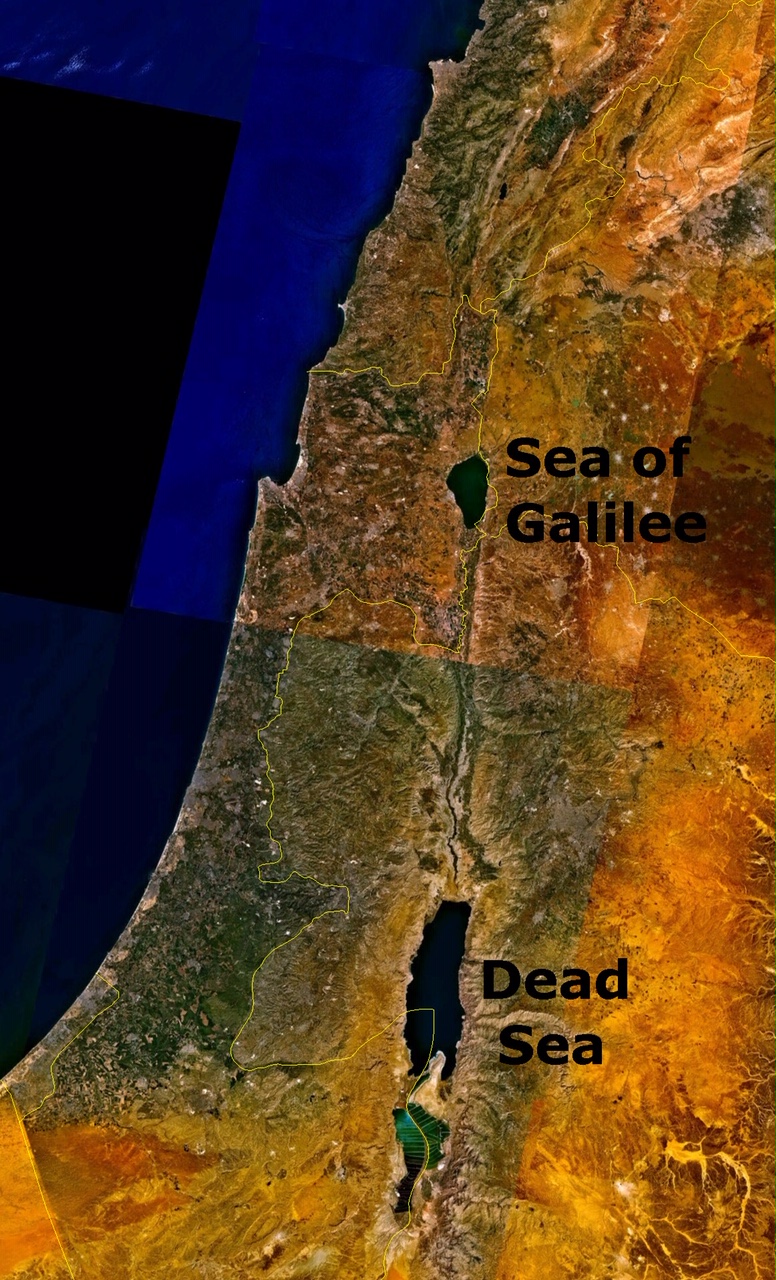 Very Important Persons from Persia visited Jesus in Bethlehem when he was about two years old. Then, soon after, his family had to Get Out Of Dodge (i.e., Bethlehem 15 miles South of Jerusalem). They barely escaped the furious wrath of Old King Herod the Great. Mary and Joseph and baby Jesus fled to Al Fustat (Old Cairo) for a season and when things were relatively safe back home in Israel they donkey-ed 500 miles to North Israel! (See Matthew 2:13-23)
Very Important Persons from Persia visited Jesus in Bethlehem when he was about two years old. Then, soon after, his family had to Get Out Of Dodge (i.e., Bethlehem 15 miles South of Jerusalem). They barely escaped the furious wrath of Old King Herod the Great. Mary and Joseph and baby Jesus fled to Al Fustat (Old Cairo) for a season and when things were relatively safe back home in Israel they donkey-ed 500 miles to North Israel! (See Matthew 2:13-23)
Someone will write up those “silent years” of Jesus someday, though not quite yet, apparently. Publishing rights for Jesus are pending! His disciples will be glad to fill us when we meet them. Your local library has lots of books conjecturing about all manner of stuff about Jesus—but a lot it what has been written is unhelpful, and even toxic, for anyone who wants to know the real God. But one important incident in the childhood of Jesus was recorded for our benefit:
“His parents went to Jerusalem every year at the Feast of the Passover. And when He was twelve years old, they went up to Jerusalem according to the custom of the feast. When they had finished the days, as they returned, the Boy Jesus lingered behind in Jerusalem. And Joseph and His mother did not know it; but supposing Him to have been in the company, they went a day’s journey, and sought Him among their relatives and acquaintances. So when they did not find Him, they returned to Jerusalem, seeking Him. Now so it was that after three days they found Him in the temple, sitting in the midst of the teachers, both listening to them and asking them questions. And all who heard Him were astonished at His understanding and answers. So when they saw Him, they were amazed; and His mother said to Him, “Son, why have You done this to us? Look, Your father and I have sought You anxiously.”
And He said to them, “Why did you seek Me? Did you not know that I must be about My Father’s business?” But they did not understand the statement which He spoke to them.
Then He went down with them and came to Nazareth, and was subject to them, but His mother kept all these things in her heart. And Jesus increased in wisdom and stature, and in favor with God and men.” (Luke 2:41-52)
Now it is actually very easy for us to envision the formative years of Jesus growing up in Israel. The towns, villages, roads, and important places are there now. Millions even dare to visit the Land where Jesus lived and died.
We must first disconnect from the rat race of Silicon Valley and our dumbed-down, fragmented idiotic daily lives! Stop and walk in the footsteps of Jesus and see how He experienced and dealt with “real life” two thousand years ago!
Jesus never went to kindergarten. He did not attend elementary school, or junior high, or high school, college, or grad school. He might have had some home-schooling from his mom along with his younger brothers and sisters, but no one is 100% certain. Jesus does not hold a PhD or a D.D. to this day, would you believe (WYB)? He was not a salaried preacher with a private jet.
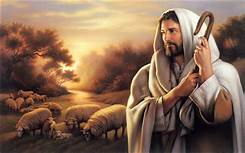 He was “self taught” (evidently) and yet ended up knowing the whole Old Testament thoroughly. (It was only available back then in lengthy hand-written scrolls in synagogues and in the Temple in Jerusalem). Hebrew only, no Greek or English. Not available on cassette or CD.
He was “self taught” (evidently) and yet ended up knowing the whole Old Testament thoroughly. (It was only available back then in lengthy hand-written scrolls in synagogues and in the Temple in Jerusalem). Hebrew only, no Greek or English. Not available on cassette or CD.
Back then there were no showers, no laundromats, no spas, no hot tubs or swimming pools. No soap, no after shave lotion, probably no deodorant.
To support his family (apparently after his stepfather Joseph died), Jesus probably carried on his father’s trade as a tekton (a carpenter, stonemason, craftsman). So he was a day-laborer for more than a decade or more? Not a union member nor a workman’s right advocate—apparently. Jesus was probably fatherless for years. Probably unpopular with the other boys in Nazareth.
Jesus had plenty of grass-roots appeal. He spoke to large crowds 10–30,000 at a pop. He did attract a few of the rich and famous, a few religionists, and quite a few Roman soldiers. Jesus for sure had magnetic crowd appeal. He had great people skills, was superb with small kids and tamed his wily disciples while in route on foot to his next “scheduled” appearance.
Crowd control became a big problem but Jesus has no security guards and no police protection. Jesus was probably self-taught and he learned most of what he knew as an adult. Jesus wrote in the sand once. But he left us no books of his own.
Jesus was probably not athletically inclined. No competitive sports skills? Watched no movies. Did no TV appearances, obviously. Was not filmed walking on the stormy Sea of Galilee! Jesus received no honoraria for his most important “key-note speeches” such as the Sermon on the Mount. Jesus—probably fatherless for years—never married, was not gay, was great around women, was brave as all get out! He handled lepers, blind men, cripples, dysfunctional women and the hopelessly lost—with ease. Jesus stood up to the bad guys as a man’s man. He loved kids.
Jesus never “slept around,” never got drunk, was probably unpopular as a boy in Nazareth (but not a sissy or a wimp). Jesus was not appreciated by his siblings until Pentecost. His mom, Mary, had glimpses. But Jesus preferred strangers over his own relatives! WYB? (Luke 4:16-31, and Matthew 12:46-50)



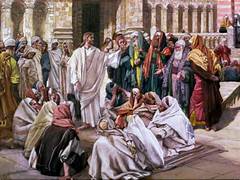
No cell phone
No iPad, no laptop
No SUV, no horse
No bicycle, no skateboard
No change of clothes, one pair of sandals
No change of underwear
No running shoes, no work boots, no sox
No fur coonskin cap, no rain coat, no gloves
No shaving kit, no deodorant
No Swiss Army pocket knife
No toothbrush, no comb
Candles or oil lamps at night when in town
No flashlight
Born in a cave (manger)
His parents were poor
No income after age 30
No Life Insurance, no Social Security
No honoraria for speaking
No secretary
No body guard
No web site
No email and no Facebook account.
No "support team" (except a few women)
No sleeping bag, no winter overcoat, no bed roll
No wheels: no bike, motorcycle, nor SUV.
Not even a skateboard!
No leather-bound KJV Bible
No home, no apartment, no condo in Jerusalem
No tent in Galilee
(He did stay in Peter’s crowded one room house in Capernaum along with Peter’s wife and family)
Jesus did not carry a briefcase full of flyers and tracts.
He did not put up any posters advertising his next appearances
No private jet or helicopter
No tomb of his own (borrowed for the weekend)
No public recognition by the “right group” or the “Establishment.”
No honorary degrees.
No doctor or dentist
No TV interviews
No wristwatch
No supps or meds
Spoke to Huge Crowds without a Sound System
 BTW, (by the way) the Romans who “owned” the land by conquest hated the Jews especially, possibly because of their freedom loving, rugged individualism and spirit of Independence. Rome was very much bugged and bothered by that unruly Provence. This ordinary man, Jesus, was actuality put to death by his own countrymen! He was only thirty years old, as well... “Read all About It”—Matthew, Mark, Luke and John are waiting to fill you in. Bible illiteracy is an awful sin against your Creator and ignorance is no excuse!
BTW, (by the way) the Romans who “owned” the land by conquest hated the Jews especially, possibly because of their freedom loving, rugged individualism and spirit of Independence. Rome was very much bugged and bothered by that unruly Provence. This ordinary man, Jesus, was actuality put to death by his own countrymen! He was only thirty years old, as well... “Read all About It”—Matthew, Mark, Luke and John are waiting to fill you in. Bible illiteracy is an awful sin against your Creator and ignorance is no excuse!
Best of all: Jesus is alive and well now and you can talk to Him yourself one-on-one with no go-between intermediaries needed! He is 100% available and has all along been giving His undivided attention all your life. You just did not know it! Surely it’s time He had your attention!
Publishing Rights for Jesus are Pending. No Book Royalties. No PR person.
“This is the disciple (John) who testifies of these things, and wrote these things; and we know that his testimony is true. And there are also many other things that Jesus did, which if they were written one by one, I suppose that even the world itself could not contain the books that would be written. Amen.” (John 21:24-25) No POR person
What Did (Does) Jesus Look Like?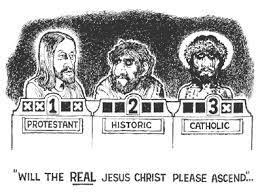
|
The average height of an Israeli man today is 5 feet 9 inches. We are used to our folk heroes (Batman, Superman, Captain Midnight, John Wayne...being over six feet tall. Even the military has certain height standards; short but good basketball players are rare). We do not have any eye witness accounts of what Jesus looked like when He was here among us. We do have His full genealogy however. The Apostle John was only a teen ager when he traveled with Jesus. When Jesus was crucified Jesus asked John to care for His mother (then about 50 years old). Tradition tells us John took Mary to Ephesus in Turkey where she lived the rest of her life. The other Apostles were all martyred, but John lived to about AD 100 as Bishop of Ephesus. Late in his life life he wrote the Gospel of John, three Letters, and the Book of the Revelation. John left us an eye witness account of what Jesus looks like now: Who is Minding the Store? The Wife of Jehovah and the Bride of Christ
Behold, He is coming with clouds,
|

The New Testament describes James, Joseph (Joses), Judas (Jude), and Simon as brothers of Jesus (Greek: ἀδελφοὶ, translit. adelphoi, lit. 'brothers'). Also mentioned, but not named, are sisters of Jesus.
The last time Joseph appears in person in any Gospel book is in the story of the Passover visit to the Temple in Jerusalem when Jesus is 12 years old, found only in Luke. No mention is made of him thereafter. The story emphasizes Jesus' awareness of his coming mission: here Jesus speaks to his parents (both of them) of "my father," meaning God, but they fail to understand. (Luke 2:41–51).
Christian tradition represents Mary as a widow during the adult ministry of her son. Joseph is not mentioned as being present at the Wedding at Cana at the beginning of Jesus' mission, nor at the Passion at the end. If he had been present at the Crucifixion, he would under Jewish custom have been expected to take charge of Jesus' body, but this role is instead performed by Joseph of Arimathea. Nor would Jesus have entrusted his mother to the care of John the Apostle if her husband had been alive.
While none of the Gospels mentions Joseph as present at any event during Jesus' adult ministry, the synoptic Gospels share a scene in which the people of Nazareth, Jesus' hometown, doubt Jesus' status as a prophet because they know his family. In Mark 6:3, they call Jesus "Mary's son" instead of naming his father. In Matthew, the townspeople call Jesus "the carpenter's son," again without naming his father. (Matthew 13:53 In Luke 3:23 "And Jesus himself began to be about thirty years of age, being (as was supposed) the son of Joseph, which was [the son] of Heli."(Luke 4:16–30) In Luke the tone is positive, whereas in Mark and Matthew it is disparaging. This incident does not appear at all in John, but in a parallel story the disbelieving neighbors refer to "Jesus the son of Joseph, whose father and mother we know" (John 6:41–51). (Wikipedia)
While He was still talking to the multitudes, behold, His mother and brothers (no sisters present?) stood outside, seeking to speak with Him. Then one said to Him, “Look, Your mother and Your brothers are standing outside, seeking to speak with You.”
But He answered and said to the one who told Him, “Who is My mother and who are My brothers?” And He stretched out His hand toward His disciples and said, “Here are My mother and My brothers! For whoever does the will of My Father in heaven is My brother and sister and mother.” (Matthew 12:46-50)
At Pentecost: The Upper Room Prayer Meeting
“Then they returned to Jerusalem from the mount called Olivet, which is near Jerusalem, a Sabbath day’s journey. And when they had entered, they went up into the upper room where they were staying: Peter, James, John, and Andrew; Philip and Thomas; Bartholomew and Matthew; James the son of Alphaeus and Simon the Zealot; and Judas the son of James. These all continued with one accord in prayer and supplication, with the women and Mary the mother of Jesus, and with His brothers.” (Acts 1:12-14)

Behold, My Servant shall deal prudently;
He shall be exalted and extolled and be very high.
Just as many were astonished at you,
So His visage was marred more than any man,
And His form more than the sons of men;
So shall He sprinkle many nations.
Kings shall shut their mouths at Him;
For what had not been told them they shall see,
And what they had not heard they shall consider.
Who has believed our report?
And to whom has the arm of the Lord been revealed?
For He shall grow up before Him as a tender plant,
And as a root out of dry ground.
He has no form or comeliness;
And when we see Him,
There is no beauty that we should desire Him.
He is despised and rejected by men,
A Man of sorrows and acquainted with grief.
And we hid, as it were, our faces from Him;
He was despised, and we did not esteem Him.
Surely He has borne our griefs
And carried our sorrows;
Yet we esteemed Him stricken,
Smitten by God, and afflicted.
But He was wounded for our transgressions,
He was bruised for our iniquities;
The chastisement for our peace was upon Him,
And by His stripes we are healed.
All we like sheep have gone astray;
We have turned, every one, to his own way;
And the Lord has laid on Him the iniquity of us all.
He was oppressed and He was afflicted,
Yet He opened not His mouth;
He was led as a lamb to the slaughter,
And as a sheep before its shearers is silent,
So He opened not His mouth.
He was taken from prison and from judgment,
And who will declare His generation?
For He was cut off from the land of the living;
For the transgressions of My people He was stricken.
And they made His grave with the wicked—
But with the rich at His death,
Because He had done no violence,
Nor was any deceit in His mouth.
Yet it pleased the Lord to bruise Him;
He has put Him to grief.
When You make His soul an offering for sin,
He shall see His seed, He shall prolong His days,
And the pleasure of the Lord shall prosper in His hand.
He shall see the labor of His soul, and be satisfied.
By His knowledge My righteous Servant shall justify many,
For He shall bear their iniquities.
Therefore I will divide Him a portion with the great,
And He shall divide the spoil with the strong,
Because He poured out His soul unto death,
And He was numbered with the transgressors,
And He bore the sin of many,
And made intercession for the transgressors.
(Isaiah 52:13 - 53:12)

To the Chief Musician. Set to “The Deer of the Dawn.” A Psalm of David.
My God, My God, why have You forsaken Me?
Why are You so far from helping Me,
And from the words of My groaning?
O My God, I cry in the daytime, but You do not hear;
And in the night season, and am not silent.
But You are holy,
Enthroned in the praises of Israel.
Our fathers trusted in You;
They trusted, and You delivered them.
They cried to You, and were delivered;
They trusted in You, and were not ashamed.
But I am a worm, and no man;
A reproach of men, and despised by the people.
All those who see Me ridicule Me;
They shoot out the lip, they shake the head, saying,
“He trusted in the Lord, let Him rescue Him;
Let Him deliver Him, since He delights in Him!”
But You are He who took Me out of the womb;
You made Me trust while on My mother’s breasts.
I was cast upon You from birth.
From My mother’s womb
You have been My God.
Be not far from Me,
For trouble is near;
For there is none to help.
Many bulls have surrounded Me;
Strong bulls of Bashan have encircled Me.
They gape at Me with their mouths,
Like a raging and roaring lion.
I am poured out like water,
And all My bones are out of joint;
My heart is like wax;
It has melted within Me.
My strength is dried up like a potsherd,
And My tongue clings to My jaws;
You have brought Me to the dust of death.
For dogs have surrounded Me;
The congregation of the wicked has enclosed Me.
They pierced My hands and My feet;
I can count all My bones.
They look and stare at Me.
They divide My garments among them,
And for My clothing they cast lots.
But You, O Lord, do not be far from Me;
O My Strength, hasten to help Me!
Deliver Me from the sword,
My precious life from the power of the dog.
Save Me from the lion’s mouth
And from the horns of the wild oxen!
You have answered Me.
I will declare Your name to My brethren;
In the midst of the assembly I will praise You.
You who fear the Lord, praise Him!
All you descendants of Jacob, glorify Him,
And fear Him, all you offspring of Israel!
For He has not despised nor abhorred the affliction of the afflicted;
Nor has He hidden His face from Him;
But when He cried to Him, He heard.
My praise shall be of You in the great assembly;
I will pay My vows before those who fear Him.
The poor shall eat and be satisfied;
Those who seek Him will praise the Lord.
Let your heart live forever!
All the ends of the world
Shall remember and turn to the Lord,
And all the families of the nations
Shall worship before You.
For the kingdom is the Lord’s,
And He rules over the nations.
All the prosperous of the earth
Shall eat and worship;
All those who go down to the dust
Shall bow before Him,
Even he who cannot keep himself alive.
A posterity shall serve Him.
It will be recounted of the Lord to the next generation,
They will come and declare His righteousness to a people who will be born,
That He has done this.
![]()

It helps to know Jesus personally, but there are many false Christs in the world. We need the whole Bible to see Him more clearly. Existential Christians are easily misled.
“For false christs and false prophets will rise and show great signs and wonders to deceive, if possible, even the elect. See, I have told you beforehand.” (Matthew 24:24)
Conservative rabbis in Israel today, including the great people at The Temple Institute are convinced that the First and Second Temples were located where the Islamic Shrine, the Dome of the Rock, now stands. In Israel, science, history, and reason don't always prevail over politics! Orthodox Jews do not believe that Jesus (Yeshua) is their promised Messiah. They see our gentile Jesus as too goy. But the real Messiah will come--he is their hope. Therefore it is incumbent on us to build and dedicate a Third Temple where messiah can officiate. Visit the Templemount Web Site.
Was Jesus a Jew? This late-15th-century painting by the Spanish artist known as the Master of Perea depicts a Last Supper of lamb, unleavened bread and wine—all elements of the Seder feast celebrated on the first night of the Jewish Passover festival. Whether the Last Supper was a Passover Seder is one issue scholars have raised as they have been discovering the Jewish Jesus. Photo: Christie’s Images/Superstock.
Jesus himself didn’t write the Gospels. They are late-first-century accounts that we are continually interpreting. In seeking to emphasize the uniqueness of Jesus, traditions have distanced Jesus from the cultural setting of his day, whether that be his Jewish roots or the larger Greco-Roman world.
In the 19th century, German theologians emphasized this distance as Saldarini explains below. Was Jesus a Jew? Was Christianity a Jewish sect? The conflicts in the early church between Peter, claiming his Jewishness, and Paul, the missionary to Gentiles, were more complex than some 19th-century theologians have allowed.
Albrecht Ritschl saw a Jesus who attacked Scribes and Pharisees and, he claimed, Judaism itself. Jesus taught something so new that it overthrew and superseded his Jewishness. Christianity itself was to be purified of its Jewish elements. Ritschl turned this theology to attacks on Jews, giving ammunition to the 20th-century Holocaust.
Ritschl’s Jesus focused on his personal relationship with God—a relationship that transcended historical contexts. But Jesus was born in a Jewish home and lived in the Jewish culture and in the land of Israel. Was Jesus a Jew? Yes, Theological study is further discovering the Jewish Jesus and what his Jewishness means to Christian theology and Jewish-Christian relations.
For Christians, Jesus’ Jewishness is critically connected to his familiar role as Christ—more than an ethereal spiritual role but a role rooted in the history of the people of Israel. Disassociating Jesus from his ethnic roots can lead to violence toward Jesus’ own people. As Anthony J. Saldarini elaborates below in “What Price the Uniqueness of Jesus?” discovering the Jewish Jesus is a task that can give Christians a better understanding of Jesus.
When I was growing up in St. Kevin’s Parish in the Dorchester section of Boston in the 1940s and ’50s, Jesus was unquestionably a Christian. Even more strangely, in Germany during the Nazi era Jesus was an Aryan Christian. How did a first-century Galilean Jew become a Christian and, for some, an Aryan Christian at that?
Before we laugh at this foolishness, we should remember that we have not one word written by Jesus and not one contemporary account of his activities. Instead, we have four late-first-century interpretations of Jesus: the Gospels. Each demands and has received constant reinterpretation. Though the risk of misinterpreting Jesus is great, every generation has no choice but to try to make sense of the Gospels.
We necessarily interpret as we read, but not all interpretations are created equal, despite the claims of some postmodern thinkers. A Christian Jesus is a parochial, self-serving myth and an Aryan Jesus a perverse one. But why then have Christians so persistently thought of Jesus as a Christian and resisted admitting the obvious, that Jesus was a Jew? Answer: the pervasive problem of uniqueness.
All religious traditions seek to present themselves as somehow special, better or primary, as irreplaceable or unique. For Christians this means that either Jesus as a person or his teachings and actions must stand out from his historical setting. For centuries the theological claim that Jesus is divine sufficed. In our empirical world of science and history, many Christian scholars take another tack; they seek to make Jesus dissimilar from the Judaism of his day and from the Greco-Roman world in which it was set.
As is often the case, contemporary historical and theological conflicts have their roots in the fertile scholarship of 19th-century Germany. The names Ferdinand Baur (1792–1860) and Albrecht Ritschl (1822–1889) may not immediately leap to mind, but a brief sketch of their activities will help illuminate Christian biases then and today.
Baur argued successfully that early Christianity had originated historically within Judaism and, less convincingly, that all of early Christian history reflected a struggle between a Jewish wing (led by Peter) and a gentile wing (led by Paul) until a synthesis was achieved. Subsequent scholarship has established that Paul was much more Jewish, and the conflicts among the early followers of Jesus much more complex, than Baur thought. But his fundamental point, the Jewish matrix of Christianity, endures.
In “Uncovering the Jewish Context of the New Testament,” Amy-Jill Levine reveals what Jews (and Christians) should know about Christian scripture and Jesus the Jew.
A Jesus who taught like a Jew and an early Christian community that looked like a Jewish sect troubled many 19th-century German Lutheran scholars, who preferred to envision a Jesus who taught a new and unique doctrine that overthrew the established tradition. In reaction to Baur, Albrecht Ritschl “solved” the problem by attacking the Jews. For him, Jesus did not reform or transform Judaism, he condemned it. Jesus the Jew, in Ritschl’s view, transcended Judaism by purifying Christianity of its Jewish elements. From the middle of the 19th century until World War II, numerous German scholars, including Adolf Harnack and Rudolf Bultmann, followed Ritschl’s lead in one way or another. None were Nazis, but reading them after the Holocaust leaves us with an eerie sensation.
Ritschl protected the uniqueness of Jesus and extricated him from his Jewish setting by replacing the Jewish Jesus with a Romantic Jesus who had a supernatural, ineffable relationship with God, a relationship that superseded all historical influences. Deep personal relationships are the stuff of modern theology and spirituality, but separated from the weave and grit of historical reality, the personal Jesus quickly devolves into a personal projection disconnected from community and culture.
So we must face the crucial question: Does Jesus the Jew—as a Jew—have any impact on Christian theology and on Jewish-Christian relations? Or is Jesus’ life as a Jew just accidental? After all, he had to be born something: Incan or Ethiopian, Mongolian or whatever. Is Jesus’ Jewishness superseded by his role as Christ, the Messiah (the “Anointed One”), sent by God to save all nations?
To wrench Jesus out of his Jewish world destroys Jesus and destroys Christianity, the religion that grew out of his teachings. Even Jesus’ most familiar role as Christ is a Jewish role. If Christians leave the concrete realities of Jesus’ life and of the history of Israel in favor of a mythic, universal, spiritual Jesus and an otherworldly kingdom of God, they deny their origins in Israel, their history, and the God who has loved and protected Israel and the church. They cease to interpret the actual Jesus sent by God and remake him in their own image and likeness. The dangers are obvious. If Christians violently wrench Jesus out of his natural, ethnic and historical place within the people of Israel, they open the way to doing equal violence to Israel, the place and people of Jesus. This is a lesson of history that haunts us all at the end of the 20th century.
“What Price the Uniqueness of Jesus?” by Anthony J. Saldarini originally appeared in Bible Review, June 1999. The article was first republished in Bible History Daily in September 2011.
Lambert's Main Library
Email Lambert Dolphin
Archive for Newsletters
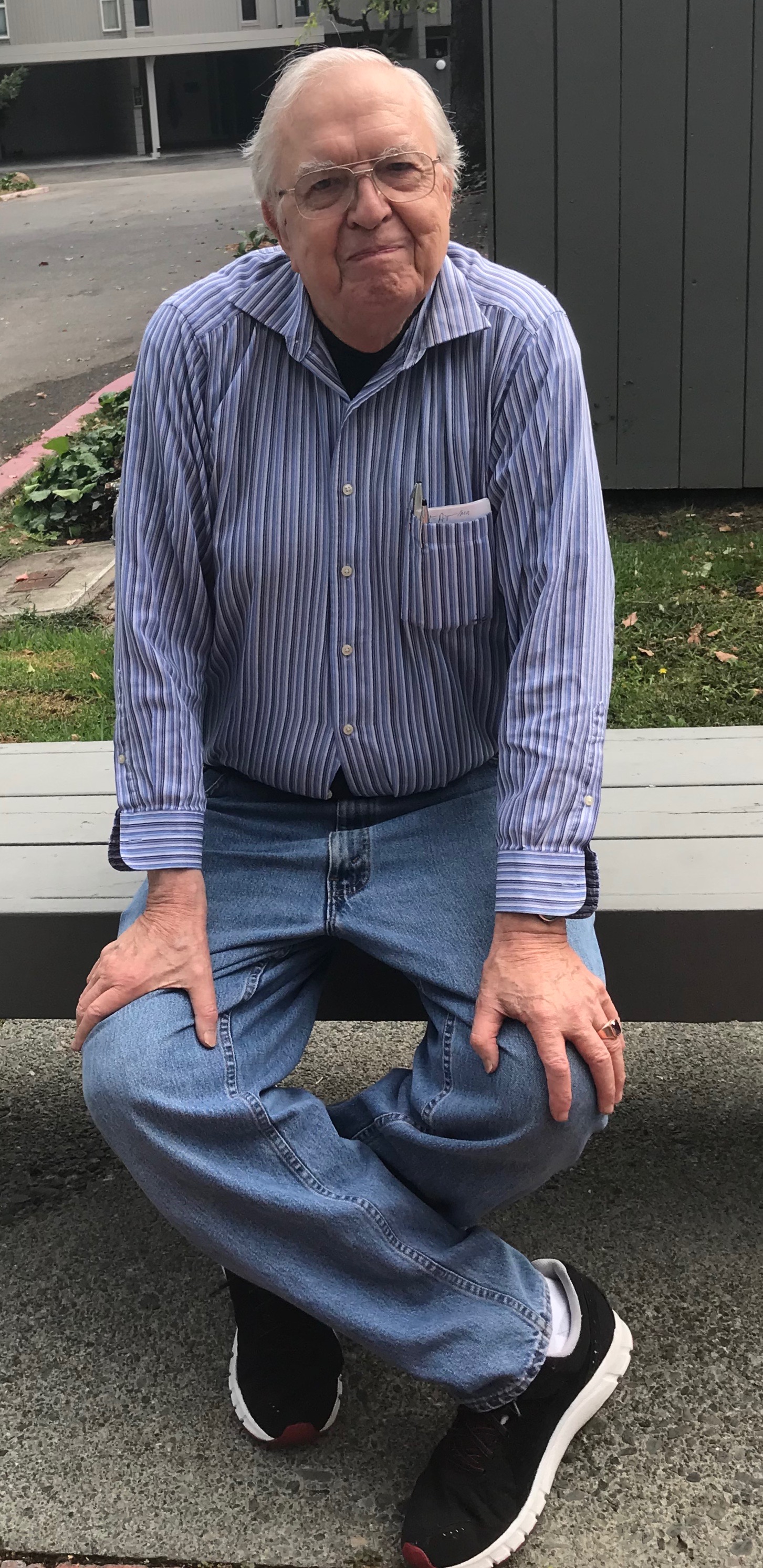
Library Annex
(900+ new articles since 2018)
Help Thyself. No Charge.
Most recent articles are at the bottom.
The search engine below should be helpful.


March 31, 2019. October 21, 2020.
March 30, 2021. April 12, 2021, August 21, 2022. January 13, 2023. April 9, 20233. December 10, 2023.